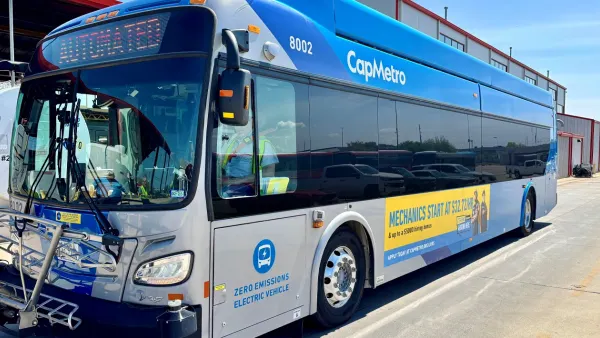Dive Brief:
- The California Air Resources Board unanimously passed a rule that will phase out gas- and diesel-powered public transit buses in the coming decades. Transit agencies will be barred from purchasing any new gas-powered buses by 2029 and will require only zero-emission buses by 2040.
- The move will take an estimated 14,000 gas-powered buses off the roads. According to an environmental impact statement, the plan would lower greenhouse gas emissions 86% by 2050 compared to a business-as-usual scenario, especially if electric charging stations are powered by renewable energy.
- California currently has just over 130 electric buses on the roads. The long lead time on the rule is designed to allow transit agencies to phase out existing buses over their current decade-plus lifespan.
Dive Insight:
Transportation makes up about 40% of California’s greenhouse gas emissions, and the vast majority of other sources of air pollution like particulate matter and smog. The state has rules encouraging electric and hybrid passenger vehicles, but officials have been increasingly looking at large trucks and buses as the next source of emission cuts. Los Angeles and San Francisco had each already passed their own rules requiring electric bus fleets.
Even as other cities and states — like Columbus, OH, Virginia, the District of Columbia and Chicago — are investing in electric buses, the move makes California the first to require them statewide. Environmentalists are hopeful that the move will be followed by statewide action to encourage electrification of other fleets, like school buses or garbage trucks.
Progress to electrify buses has been slow because of concerns about how far the buses could run on a single charge and whether they will hold up with a full passenger load (especially in hilly cities like San Francisco). The Los Angeles Times reports that some electric buses there have broken down, and Albuquerque, NM recently canceled a contract with electric bus manufacturer BYD over safety concerns with the vehicles’ batteries and chargers.
Michael Pimentel, legislative and regulatory advocate at the California Transit Association lobbying group, told the Associated Press that there were "concerns" about performance for zero-emission buses and that some agencies may not have enough money available to make the transition.
Still, there’s hope that California’s spending and the new investments around the country will lower the cost and smooth out any safety concerns as more electric buses go on roads. Earthjustice staff attorney Adrian Martinez said in a statement he was “hopeful that California will spark a national trend that will transform public transit.”










